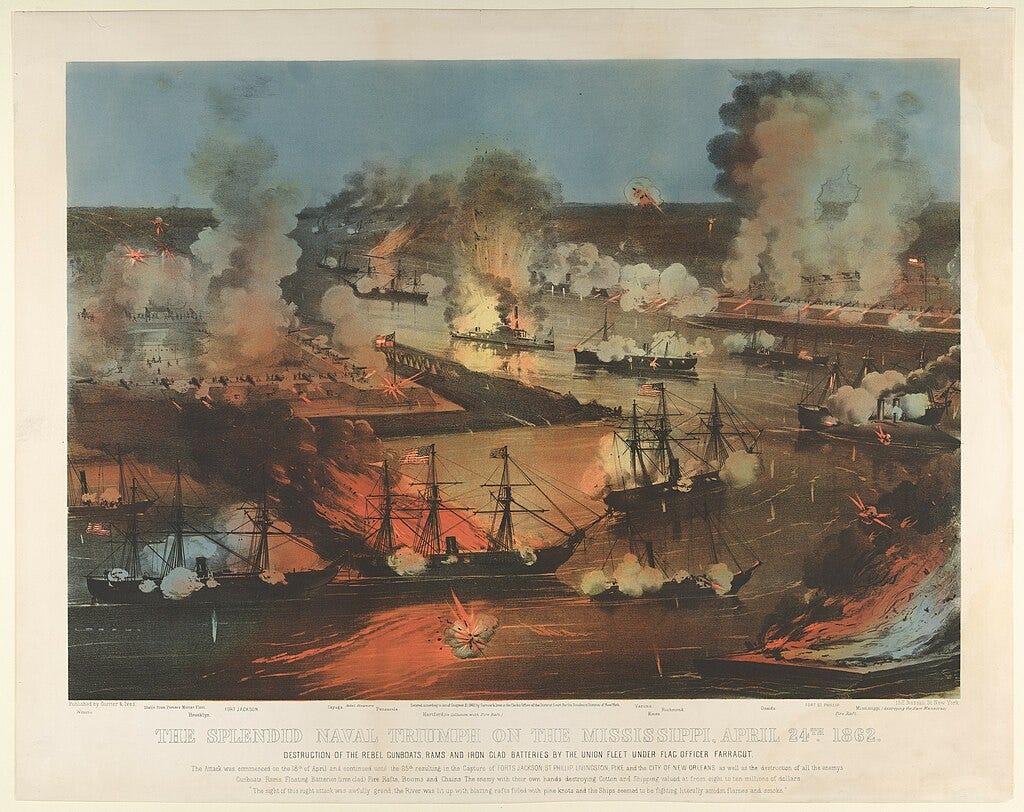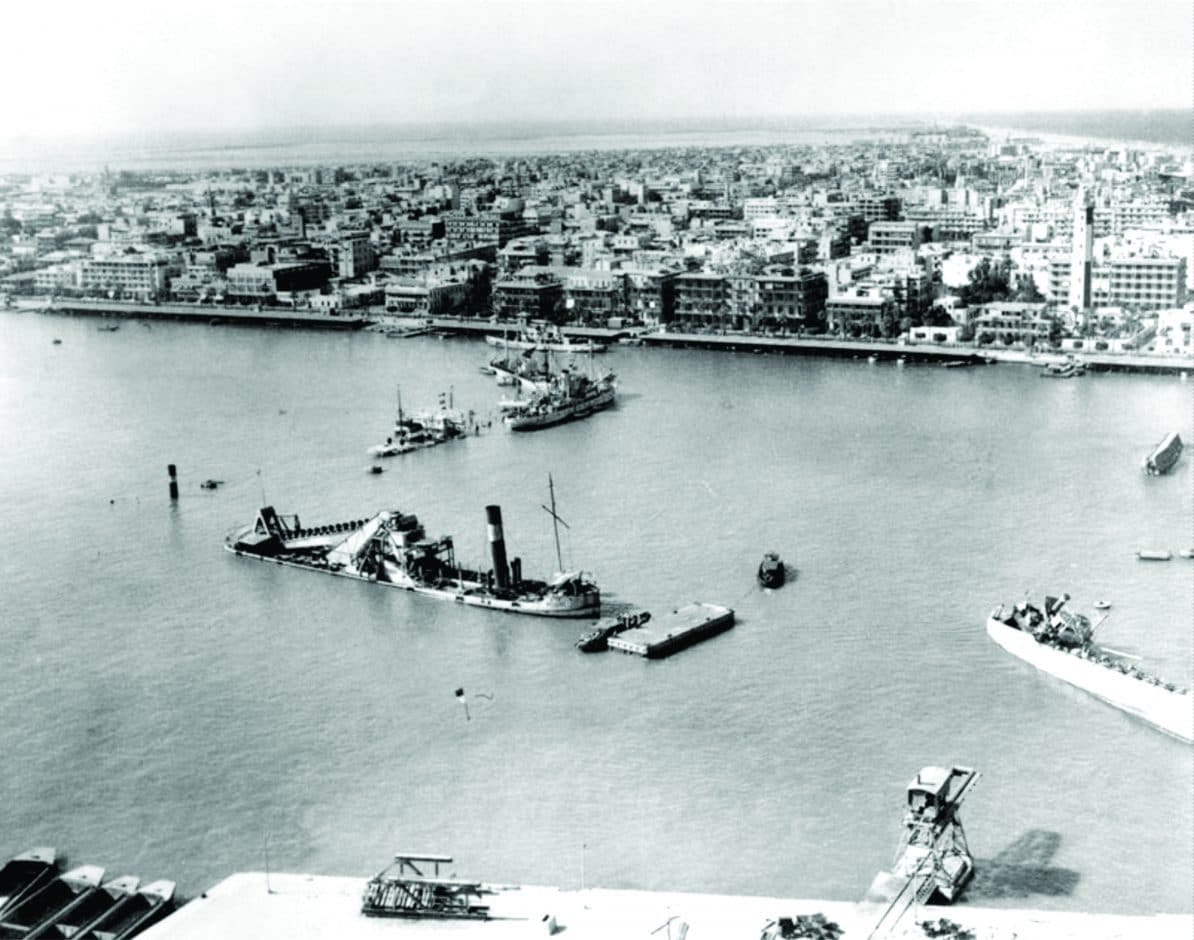From McNamara to TQL to the Age of Transformation, people trying to spot-weld an unalloyed business perspective to military requirements have done more to damage the military capability of the USA in my lifetime than anything else. That was the critique I made when I finished my state-university MBA in the mid-1990s, so … yeah; I have a long-standing hair-trigger on the topic.
It is easy to roll your eyes and move on, but moneyed people in the civilian sector - by themselves or via well-funded institutions - who decid to leverage their money and influence to play military theorists have a VERY long tradition of mucking things up more than helping. Some have good intentions, but on balance, they lead to ruin if not properly humble, informed, and checked by others with a longer view of military requirements.
And so, when The National Interest published an article titled, Houthi Red Sea Attacks Carry Hard Lessons for the West with a sub-title “Counting warships may no longer be the best guide for assessing a country’s ability to halt and control sea lanes“ by a guy Ramon Marks, Vice Chair of an organization called Business Executives for National Security with a guy named Jennifer Pritzker (yes, that Pritzker family) on its front page, well, you have my attention.
Nothing personal, Mr. Marks. This is strictly, ahem, business.
It’s not a long article, but it is filled with bad ideas informed by an exceptionally thin understanding of history, international politics, and military capabilities. Besides that, Mrs. Lincoln, it is an interesting article.
Let’s dive in.
From the opening paragraph, you know we’re hip-deep in fuzzy thinking.
The U.S. Navy has its hands full in the Red Sea. The Houthis continued to confound and choke maritime traffic through the strategic passageway despite repeated attacks by an array of United States naval powers aimed at eliminating the threat. Since January 2024, the Navy has struck Houthi targets repeatedly with missiles, drones, and F-18 Super Hornets. Vice Admiral Brad Cooper, the Deputy Commander of U.S. Central Command, noted in February that one would have to return to World War II to find naval battles of comparable size and scope. Over 7,000 sailors have been committed to the fight. As he put it, “they’re getting shot at, we’re getting shot at, and we’re shooting back.”
Notwithstanding U.S. naval firepower, the Houthis are holding their own, still regularly attacking Red Sea commercial shipping and U.S. warships. In March, the Houthis shot an anti-ship missile at the USS Laboon, an Arleigh Burke-class warship that reportedly cost close to $1 billion to build. Guerilla warfare has spread from land to the seas.
As we’ve discussed often, we have a written record of over 2,000 years of how to deal with piracy. People, empires, and technology may change, but the formula is the same; kill the pirates, destroy their weapons, eliminate their bases, take their money, starve what’s left.
Piracy is, at its core, a business. It can be underwritten by religion - North African Muslim pirates raiding all the way up to Iceland as late as the 17th Century is just one example that can inform what the Houthi are doing today.
We are not fighting the Houthi in the Red Sea, we are fighting their weapons. It isn’t “guerilla warfare” - not even close - it is on the high-end “Area Denial,” at the base low-end, just state-sponsored proxy piracy.
What we’re not doing?
Extended strikes ashore (limited ones now don’t count)
Sea blockade
Land blockade
Elimination of leadership
Destruction of supporting infrastructure in port and ashore
Why these things are not happening is not a military matter; this is a political matter. It is clear that the Commander’s Intent and Higher Direction and Guidance from the POLMIL level does not want to do this. So, we’ll do an incomplete job instead. The results speak for themselves.
What is happening in the Red Sea shows how the development of mobile, land-based, anti-ship missiles and cheap drones are revolutionizing naval warfare just as aircraft carriers did in the last century. Surface fighting ships, including carriers, can no longer lay absolute claim to ruling the seas. These surface platforms must keep a wary eye on shore-based weapons systems accessible to nation-states and even rebels. Ukraine’s success in beating back the Russian Navy with drones and missiles in the Black Sea has been copied in the Red Sea by the Houthis, something that would have been unimaginable just a few years ago.
What ahistorical gobbledygook. There is nothing revolutionary about ASCM. They have been around on this planet as long as I’ve been, and are simple modern versions of shore-based anti-shipping fires that have existed since the Claw of Archimedes and catapults of Syracuse.
As for Ukraine in the Black Sea, the defense of their coastline was not “unimaginable” - it was planned for years. The ASCM that sunk the Moskva did not suddenly emerge from Zeus’s head. The threat from small boats to large ships - manned as they were to attack the USS Cole (DDG 67) over two decades ago, as drones as the Ukrainians have used - is a well-known threat. Just ask the crew of the USS Housatonic or the Turkish steamer Intibah in the mid-19th Century.
The problem here is that the threat was poo-poo’d by people who were more interested in the “sexy stuff” instead of defending against a known “unsexy” threat. The lack of anti-air capability in numbers is a direct byproduct of a lack of proper sponsorship. How many General Officers with an air defense background have been promoted to the most influential levels in The Pentagon? We’ve addressed this issue often over the years.
Now we go try to learn the wrong lessons and dragging them to the Pacific.
China has mobile anti-ship missiles and drones arrayed all along its roughly 19,000-mile littoral coastline (including islands). Taking on those unsinkable, land-based Chinese missile and drone systems would be even more challenging for the U.S. Navy than fighting the Houthis.
Yes, the PRC will be a much greater challenge than the 4th-rate power that are the Houthi, but it must be challenged back. Otherwise, we surrender the Pacific west of the International Date Line without a shot being fired. That is just national cowardice.
The key is to attrite the threat and have a robust defense against them. That requires long-range precision weapons supported by a diverse tool kit of reconnaissance and surveillance assets delivered by a mass of platforms with robust, layered defensive systems.
This. Is. Not. New.
Imagine if the US Navy never challenged harbor defenses during The Late Unpleasantness?
…the Houthis’ Red Sea attacks is its introduction of what may be a permanent change in global trade and transportation patterns. Traditionally, 40 percent of trade between Asia and Europe has gone through the Red Sea. Maritime commerce has already been forced to reroute much of that traffic because of continued Houthis attacks, taking the longer and more expensive journey around South Africa’s Cape of Good Hope. Egypt’s revenues from Suez Canal traffic moving through the Red Sea have plunged, undermining an ailing economy critical to Middle East stability.
I guess I’m the only person who remembers the various wars and moments of crisis around the Suez Canal in the 20th Century? “Permanent?” Really people. Get off the fainting couch and start building ships and weapons.
And here is the most unforgivable problem of the article in the penultimate paragraph:
There is not much likelihood that the U.S. Navy, joined by European allies under Operation Aspides, can devise a definitive military solution to eliminate Houthi missile and drone attacks. A continuing naval stalemate with the Houthis is not a win. Seeing no real military fix, Washington has already begun to cast about for a diplomatic formula, even reaching out to Tehran for help in backchannel negotiations.
I’m sorry - the Houthi problem is not a military problem, it is a political one. Make no mistake, there is unquestionably a military solution to the problem presented by the Houthi. Again, the reason they are not being done is strictly one of politics, domestic and international.
The US Navy and the occasional partially mission capable European ships that show up, could, with a little help from the air and ground component, fix the problem, at least in the medium to short term.
I’d ask you to look at the last sentence above. There you will find the deeper problem. Let’s pull that out and look at it some more.
…reaching out to Tehran for help…
If that is even one of the cards you are playing - then you have a view of a world that does not exist. The Houthi are a proxy of Iran. The Houthi are doing what they are doing in the Red Sea because Iran wants them to.
Hamas attacked Israel on October 7th because Iran wanted them to.
For my dear readers, what I want you to take away from today’s post is this: people with money and influence still think, on the 27th of June in the year of our Lord, Two Thousand and Twenty-Four, that to solve problems in the Red Sea that we should be, “…reaching out to Tehran for help…”







Testify. Just because the principles of war are distilled over millennia of experience doesn't make them invalid. It makes them classic. Ignore them at your peril.
Porter was selected to get rid of the Caribbean Pirates 🏴☠️ n the 1820’s because he was a man of action. He killed them using unconventional naval tactics and finding them in shallow water using barges. He innovated.
Oh and TQL still stands for: They Quit Leading.